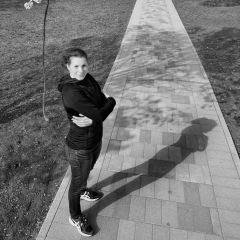Первые израильские удивления.
1. Человек, идущий навстречу, смотрит в глаза. Точнее, так: если он вообще на меня смотрит, то - в глаза, и не едва заметное мгновение, а несколько секунд. Наверное, нет разницы, кто на кого посмотрел первым. И нет разницы, какого пола тот человек.
Поначалу было не по себе. Нас учат смотреть не в глаза, а как бы в глаза. На самом деле - куда-то в переносицу. Взгляд в глаза интерпретируется как агрессия, нарушение границ, дерзость; вплоть до учительской версии "наглость". Зато опустил глаза - стесняется, послушный, уступчивый. С ним как бы проще. Правда, "бегающие" глаза ещё хуже, чем оба эти варианта.
А здесь - вот прямо... "и пусть бы любой, если надо, мог, вломившись в дверь без доклада, с обидчиком честно скрестить клинок и твердость мужского взгляда" (с).
Реализовано не только по отношению к "обидчику" - ко всем. Скрещение взглядов. Свобода смотреть в другого.
2. Если на меня показывают пальцем, значит, это точно ко мне обращаются. Кто-то пытается пролезть к кассе передо мной, кассир показывает на меня пальцем и говорит: "ты!" - и действительно обслуживает меня, а не кого-то.
В автобусе пожилому мужчине кажется наиболее удобным моё место, показывает на меня пальцем и просит уступить.
Жест, который точно есть, но исключительно как признак выраженной невоспитанности, оказывается осмысленным и совсем иначе воспринимается.
Последнее израильское удивление.
В Тель-Авиве есть торговый центр, называемый "Дизенгоф". Куча отделов и кафе, но очень сложная навигация, из-за чего он сам по себе приключение. В предпоследний день моей поездки я туда забрела. Шла себе, думая о чем-то, и пришла в отдел, название которого запомнила как "Израильский сувенир". Продавец, пожилой мужчина, спросил, на каком языке я говорю - иврит, английский, немецкий? Я выбрала немецкий, после чего он поинтересовался, не говорю ли я на идиш. Я сказала, что немного говорю. В итоге ближайшие несколько минут он рассказывал про товар в своем магазине на идиш. Всё было понятно, даже не по контексту, а непосредственно.
Сильное ощущение - когда я последний раз слышала этот язык вживую, от носителя? Давно. Думала, честно говоря, что больше не услышу. И вот он, идиш. Бобэлошн*, в моём случае.
Я не решилась сказать тому человеку что-либо о своей реакции на язык, не была уверена, что ему это интересно, да и просто слов не хватило. А потом не могла вспомнить, где же отдел, хотя явно находилась совсем рядом.
Если кто найдет того человека, передайте, пожалуйста, ему от меня привет.
*Бобэлошн - "бабушкин язык" (производное от "мамэлошн", мамин язык, идиш, в отличие от "лошнкойдеш", "святой язык", иврит; в период, когда это восприняли альтернативой, на идиш разговаривали, а на иврите молились).
1. Человек, идущий навстречу, смотрит в глаза. Точнее, так: если он вообще на меня смотрит, то - в глаза, и не едва заметное мгновение, а несколько секунд. Наверное, нет разницы, кто на кого посмотрел первым. И нет разницы, какого пола тот человек.
Поначалу было не по себе. Нас учат смотреть не в глаза, а как бы в глаза. На самом деле - куда-то в переносицу. Взгляд в глаза интерпретируется как агрессия, нарушение границ, дерзость; вплоть до учительской версии "наглость". Зато опустил глаза - стесняется, послушный, уступчивый. С ним как бы проще. Правда, "бегающие" глаза ещё хуже, чем оба эти варианта.
А здесь - вот прямо... "и пусть бы любой, если надо, мог, вломившись в дверь без доклада, с обидчиком честно скрестить клинок и твердость мужского взгляда" (с).
Реализовано не только по отношению к "обидчику" - ко всем. Скрещение взглядов. Свобода смотреть в другого.
2. Если на меня показывают пальцем, значит, это точно ко мне обращаются. Кто-то пытается пролезть к кассе передо мной, кассир показывает на меня пальцем и говорит: "ты!" - и действительно обслуживает меня, а не кого-то.
В автобусе пожилому мужчине кажется наиболее удобным моё место, показывает на меня пальцем и просит уступить.
Жест, который точно есть, но исключительно как признак выраженной невоспитанности, оказывается осмысленным и совсем иначе воспринимается.
Последнее израильское удивление.
В Тель-Авиве есть торговый центр, называемый "Дизенгоф". Куча отделов и кафе, но очень сложная навигация, из-за чего он сам по себе приключение. В предпоследний день моей поездки я туда забрела. Шла себе, думая о чем-то, и пришла в отдел, название которого запомнила как "Израильский сувенир". Продавец, пожилой мужчина, спросил, на каком языке я говорю - иврит, английский, немецкий? Я выбрала немецкий, после чего он поинтересовался, не говорю ли я на идиш. Я сказала, что немного говорю. В итоге ближайшие несколько минут он рассказывал про товар в своем магазине на идиш. Всё было понятно, даже не по контексту, а непосредственно.
Сильное ощущение - когда я последний раз слышала этот язык вживую, от носителя? Давно. Думала, честно говоря, что больше не услышу. И вот он, идиш. Бобэлошн*, в моём случае.
Я не решилась сказать тому человеку что-либо о своей реакции на язык, не была уверена, что ему это интересно, да и просто слов не хватило. А потом не могла вспомнить, где же отдел, хотя явно находилась совсем рядом.
Если кто найдет того человека, передайте, пожалуйста, ему от меня привет.
*Бобэлошн - "бабушкин язык" (производное от "мамэлошн", мамин язык, идиш, в отличие от "лошнкойдеш", "святой язык", иврит; в период, когда это восприняли альтернативой, на идиш разговаривали, а на иврите молились).
The first Israeli surprise.
1. A person walking towards meets his eyes. More precisely, this: if he looks at me at all, then - in the eyes, and not a barely noticeable instant, but a few seconds. Probably there is no difference who looked at whom first. And it makes no difference what gender that person is.
At first it was not for myself. We are taught to look not in the eyes, but as it were in the eyes. In fact - somewhere in the nose. A look in the eyes is interpreted as aggression, violation of borders, audacity; up to the teacher's version of "arrogance." But he lowered his eyes - shy, obedient, compliant. With him as it is easier. True, shifty eyes are even worse than both of these options.
And here - right here ... "and if anyone could, if necessary, could, having broken into the door without a report, honestly cross the blade and the hardness of the male gaze with the offender" (c).
Implemented not only in relation to the "offender" - to all. Crossbreeding. Freedom to look at another.
2. If they point a finger at me, it means that they are definitely turning to me. Someone is trying to crawl to the checkout in front of me, the cashier points his finger at me and says: "you!" - and really serves me, not someone.
In the bus, an elderly man seems to be the most comfortable place for me, points his finger at me and asks me to give up.
The gesture, which is definitely there, but only as a sign of pronounced bad manners, turns out to be meaningful and is perceived quite differently.
Last Israeli surprise.
In Tel Aviv, there is a shopping center called Dizengoff. A lot of departments and cafes, but very difficult navigation, which is why it is an adventure in itself. On the penultimate day of my trip, I wandered there. She went to herself, thinking of something, and came to the department, whose name she remembered as "Israeli souvenir". The seller, an elderly man, asked what language I speak - Hebrew, English, German? I chose German, after which he wondered if I spoke Yiddish. I said I talk a little. As a result, the next few minutes, he talked about the goods in his store in Yiddish. Everything was clear, not even by context, but directly.
A strong feeling - when was the last time I heard this language alive, from a carrier? Long. I thought, frankly, that I would not hear anymore. And here he is, Yiddish. Bobeloshn *, in my case.
I did not dare to tell the person anything about my reaction to the language, I was not sure that he was interested in it, and I simply didn’t have enough words. And then she could not remember where the department was, although it was obviously very close.
If anyone finds that person, please say hello to him from me.
* Bobeloshn - "grandmother's language" (derived from "mameloshn", mother's language, Yiddish, unlike "horse", "holy language", Hebrew; in the period when it was perceived as an alternative, they spoke Yiddish and Hebrew prayed) .
1. A person walking towards meets his eyes. More precisely, this: if he looks at me at all, then - in the eyes, and not a barely noticeable instant, but a few seconds. Probably there is no difference who looked at whom first. And it makes no difference what gender that person is.
At first it was not for myself. We are taught to look not in the eyes, but as it were in the eyes. In fact - somewhere in the nose. A look in the eyes is interpreted as aggression, violation of borders, audacity; up to the teacher's version of "arrogance." But he lowered his eyes - shy, obedient, compliant. With him as it is easier. True, shifty eyes are even worse than both of these options.
And here - right here ... "and if anyone could, if necessary, could, having broken into the door without a report, honestly cross the blade and the hardness of the male gaze with the offender" (c).
Implemented not only in relation to the "offender" - to all. Crossbreeding. Freedom to look at another.
2. If they point a finger at me, it means that they are definitely turning to me. Someone is trying to crawl to the checkout in front of me, the cashier points his finger at me and says: "you!" - and really serves me, not someone.
In the bus, an elderly man seems to be the most comfortable place for me, points his finger at me and asks me to give up.
The gesture, which is definitely there, but only as a sign of pronounced bad manners, turns out to be meaningful and is perceived quite differently.
Last Israeli surprise.
In Tel Aviv, there is a shopping center called Dizengoff. A lot of departments and cafes, but very difficult navigation, which is why it is an adventure in itself. On the penultimate day of my trip, I wandered there. She went to herself, thinking of something, and came to the department, whose name she remembered as "Israeli souvenir". The seller, an elderly man, asked what language I speak - Hebrew, English, German? I chose German, after which he wondered if I spoke Yiddish. I said I talk a little. As a result, the next few minutes, he talked about the goods in his store in Yiddish. Everything was clear, not even by context, but directly.
A strong feeling - when was the last time I heard this language alive, from a carrier? Long. I thought, frankly, that I would not hear anymore. And here he is, Yiddish. Bobeloshn *, in my case.
I did not dare to tell the person anything about my reaction to the language, I was not sure that he was interested in it, and I simply didn’t have enough words. And then she could not remember where the department was, although it was obviously very close.
If anyone finds that person, please say hello to him from me.
* Bobeloshn - "grandmother's language" (derived from "mameloshn", mother's language, Yiddish, unlike "horse", "holy language", Hebrew; in the period when it was perceived as an alternative, they spoke Yiddish and Hebrew prayed) .
У записи 27 лайков,
1 репостов,
1013 просмотров.
1 репостов,
1013 просмотров.
Эту запись оставил(а) на своей стене Ася Аксельрод














































